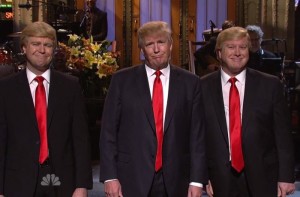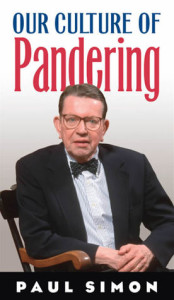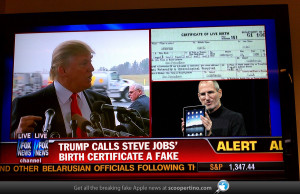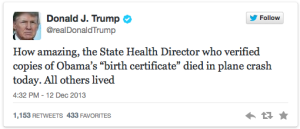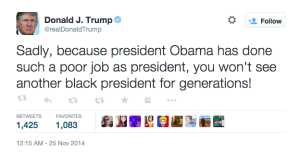European philosopher Peter Sloterdijk once wrote: “pandering obstructs pondering.” Nothing could be more evident than considering the travails of US political coverage of the latest presidential circus. The romantic nostalgia that Trump’s candidacy has tapped into represents a few of the dark underbellies of America that we would do well to take heed. Unlike most nations, Americans live in a unique circumstance in which politics follows the cultural trends, and not vice versa. One of the many alarming trends on full display during the last couple presidential elections is just how dominant the cult of celebrity is in American culture. It is this pervasive nexus between celebrity and power that produces the most recent reality-TV show we are all watching. It is no secret that Americans have traded in the substance of a C-SPAN or NPR for superficial and sensationalized infotainment and ideology. Political diehards who actually know who their representatives are or attempt to dissect and read massive pieces of legislation like the Affordable Care Act are few and far between. We have known for a long time how sterile, unaccountable or too comfortable democrats and republicans are, while leading us to dead ends politically, which shows why anti-political sentiments and cynicism remain a strong fixture of American society. Vague slogans and Twitter rants have replaced the boldness to ask questions or to have knowledge from experience as a prerequisite to run for office. In the words of Sarah Palin, “Trump is the one everybody would like to have a beer with out of all the candidates.” This feeds the strong social expectation that identifies Americans as simple-minded, anti-intellectual, or even dumb; a culture that came up with a book series, which covers anything “for dummies.” So this kind of production reinforces that stereotype, which has become a popular way of American self-parody. It is no mystery that we are in an age largely known as the “dumbing down of America.” Take skits like the Tonight Show’s “man in the street” that exposes the lack of knowledge Americans generally have about political and historical information.
In his final book, Our Culture of Pandering, US Senator Paul Simon warned about the dangers of mainstream media and ruling elites playing on the ignorance, fears, and luxuries of a homogeneous audience. The concern that “America isn’t winning anymore” feeds into the monopolistic economic consumerism and speaks to the emphasis on what Simon calls “scandalmongering”: “It is possible that this greater attention to corruption reflects a rising moral standard journalists expect of officeholders. I am sure that is true of some in the media, but my overall impression is that it is primarily a race to win viewers or readers and to win the ‘gotcha’ prize” (Southern Illinois University Press, 2003, 63). The media has exacerbated a vulgar pragmatism concerned with keeping score and providing demagoguery to the “pampered” as part of the show business industry that drives much of the mainstream obsessions. The Trump fetish revolves around the possible backlash to result from the latest scrimmage he ensues, otherwise you have already heard the message. Such spectacle and hoopla replaces any meaningful or synthetic approach for us to honestly tackle “the issues.” On top of this superficial focus is the spread of panic and desperation, which has been generated due to the normalization of mass shootings, terrorism, and the essential fascination that violence has for the American cultural imagination, both through militainment and police overkill.
Process philosopher Alfred North Whitehead explains how this American idea of a vulgarly pragmatic exceptionalism gained prominence through a conspicuous economic or commercial sense of value that solidified itself in a chauvinistic materialism, “The right of the common man to a good life is interpreted as the right of a few exceptional individuals, say one in a thousand—or less—to exploit the resources of a new continent in such a way as to make themselves inordinately rich. When I say ‘exceptional’ I do not wish to be understood as meaning that they are superior. In every other relationship of life besides the making of money they may be, and quite often are, inferior. But as the nineteenth century proceeded on this continent, they were the ones who ran away with your [American] political myth, and with them it degenerated into the false and vulgar idea that anybody in America could get rich if he were willing to set his mind to it. In this present century you are having to rescue the original conceptions of your political myth from those few individuals controlling corporate wealth [the mainstream] who falsified it” (Dialogues of Alfred North Whitehead as Recorded by Lucien Price, Boston: Little, Brown and Company, 1954, 269).
The rise of Trump represents the prevalence of corporate pathology and professional bullying—the kind that declares, “you’re fired”; calls on us to be merciless, mean, and unrelenting in our installation of a “fatherland”; or needs to verify Steve Jobs and Obama’s birth certificates. Trump embodies this unapologetic corporate ethos well. Having already been corrupted by fame and power, Trump puts on the personae of speaking from a position of self-righteous superiority. Why is it that people are unable to recognize such damaged goods, one who talks as a lady scorned? Two glaring ironies should jump right out for any vigilant observer: first, Trump plays up the victimology card that he is unfairly portrayed or lied on by the media—the same forces which have catapulted him to this latest stardom. Immersing yourself into the around the clock news cycle, while also claiming that one is at the mercy of the propaganda machine is a classic bait and switch. American celebrities continuously complain about the spotlight they aspire to achieve and then make their followers feel guilty about it. Such pretentious attitudes do not speak from a position of innocence but call to mind the self-absorbed consciousness of inflated egos. Why, for example, is the media “very dishonest,” while they cling to every word of a “tell it like it is, no nonsense” candidate like Trump who presumably cannot be dishonest since he funds his own campaign?
The other irony deals with what I call the “cult of success.” People who amass ungodly amounts of wealth are prone to never be satisfied, and may even be irritable at the mere idea of possible defeat. In the same way a politician would never pass on the opportunity to pretend to always have the solution to fix a problem, such an attitude marks an unapologetic effort to evade human realities. There are two basic features we have to reiterate when dealing with logics of success: the first is that there are no real loyalties from this vantage point, in order to be successful and move to the top one should look out for their own self-interest, so much so that they never ultimately commit themselves to anything. People who stand for nothing are bound to fall for anything, as the cliché goes. The other problem with success is the way we recycle what has been a market success in multitudinous ways. From Star Wars, Rocky, to politicians like Trump and Clinton, America seems to be the place of vulgar pragmatism or whatever “works” without much risk and remains very “low energy.” American self-deception is only growing deeper and wider with this kind of cult-like, ideological commercialization of success. It is as if we are pre-programmed to go with what is popular ad nausea even if it happens to be Vladimir Putin. Status quo folks like Trump and Clinton have been running things for way too long and the ignorance of Americans about this is simply deplorable—I wonder if other billionaires count as “outsiders” as well? How arrogant does one have to be in order to believe that personal success or luck will easily translate on a national or even global scale?
One word—Again! —What exactly does “again” mean in “make America great again”? Being only concerned with winning, it is evident that Americans are competing against themselves and Trump wants to defeat the “worst” of us—those unwilling to be cut-throat or fall in line with the false superiority of white privilege. That is what the “again” means to me, it has nothing to do with shadowy enemies in the Middle East, like terrorist networks. Like an athlete who exaggerates feats of the body, Trump grandstands bigotry and a want to be slave owner mentality as challenges to mainstream political correctness. Americans symbolize a polyethnic, de-nationalized people which Trump fails to appreciate (unless you work for him) and commits the error of territorializing reason. Not only does the “immigration purge” sound like twenty-first century neo-nationalist fascism, but also it’s in direct contradiction to how Americans live and engage the world. Our way of life through entertainment is transnational and transcultural—we invade the borders and homes of folks everyday through shows like Apprentice, through our sports, movies, music, etc. American corporations have no problem importing goods and services from around the globe and outsourcing American jobs, as long as they get to bastardize the world while they do it. Americans are infatuated with those who can flaunt their wealth, bully others into submissive conformity through vitriolic rhetoric, and have little remorse for doing so. Trump is showing us a genuine depiction of folks who never really wanted to apologize or felt the need to justify their greed, but were bad actors in living out the reverse portrayal. So, the Trump fiasco is very telling about the way that “business as usual” operates from behind the scenes. Do you think Trump is an isolated case of bravado and insensitivity? Hardly! I think it happens to be more of the norm, which is rarely witnessed because of the façade that determines much of how we come to see the pathology of corporate personhood. Trump brings to the surface how the mainstream operates and usually sees the world without the reservations of “public appeal.” It’s actually good to see “the emperor naked,” showing their real cards without any remorse or being reminded, “ohh yeah, I have to look the part and represent myself as a dignified authority.” That’s when you get the chorus coming out demanding that “Mr. Trump ought to apologize,” but without immense pressure from the transmedia they are sympathetic to his culture vulture tactics and really fetishize to be like him.
